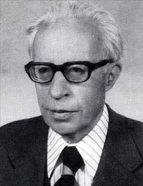

b) However, the clarification of his epistemic position was linked to his refutation of experimental psychology of a positivist character in the framework of the dominant scientism, of which the major proponent in Coimbra was the former theologist Alves dos Santos, director (from 1912) of the Laboratory of Experimental Psychology and a believer in methodologies inscribed within the horizon of psycho-physiology, associated functionally with pedagogy, in a unsustainable position that needed to harmonize idealism and empiro-criticism in an eclecticism of a positivist character. In a long study of recognition (‘the affective stain of memory’), the doctoral thesis supervised by in Geneva (1928) by Édouard Claparède and H. Antipoff, he gives an account of the narrowness of naturalism and warns of the inadequacy of the sociological and positivist tenor of psychologism, that attends more to the metaphysical and monist root of the species or human nature than it understands the profound experimental novelty and individualizing epilogues (in 1946 he published a text that is a radical innovation in the psycho-sociological bibliography, Normal, anormal e patológico). He would conclude that it was inappropriate to quantify the unquantifiable, the freedom of the spirit, the Anterian fact of conscience, and so decided to devote more of his teaching efforts to the phenomenological investigation of the intentionality of conscious acts (Max Scheler), just as later, with a clearly comprehensivist seal, proximate to Jung and Jaspers, he would tackle perceptive theories of learning and the structuralist globalistic methods of Gestalt (Wertheimer, Köhler, Koffka). As he put it, ‘the recognition of the categorical heterogeneity of the mechanical, the physical-chemical, the biological, the psychic, animic or the spiritual, for me is not the fruit of speculations upon the sphinx-like face of experience; I shall always remain unaware (because I am relative, human) of what are, ontologically, material, life, psyche, spirit’ (OC II, 2002, p. 1508). The esse is metahistorical. By way of epistemic sequel: it is unthinkable to treat the historiographical object as a thing, if it is a construct; hence the need to refute the ontologization or ontological regionalization of Portuguese culture, of any culture, since only its historicity is graspable.
c) His position can be better understood when he traces the História da Psicologia em Portugal (1949), concluding that ‘today it can almost be affirmed, without humorous insights, that Portuguese psychology as pure psychology starts … by not existing’, given over to amateurs, ‘doctors, psychiatrists, sociologists, philologists, pedagogues, and not properly to professional psychologists’, since ‘it will never be the “Diários do Governo” of any hue, party or sect that will produce by miraculous decrees the professionals of psychology’ (idem, pp. 1491–92).
